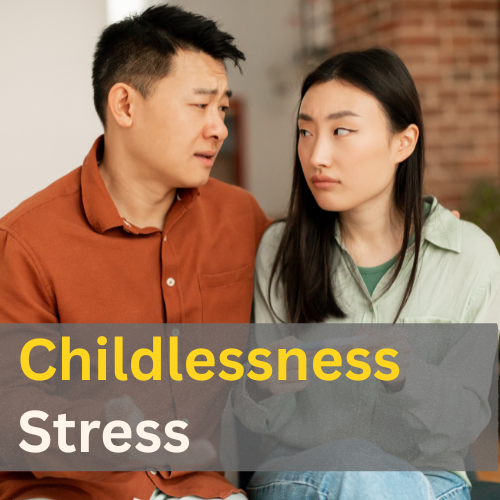Table of Contents
Introduction
The inability to have children is one of the most emotionally taxing experiences a woman can face. For many women, the journey to motherhood is filled with hopes and dreams, but for those who are unable to conceive, this journey can lead to feelings of deep distress, frustration, and grief. The psychological impact of infertility or the inability to have children is often overlooked, but it plays a significant role in a woman’s mental well-being.
This blog delves into the complex emotional and psychological challenges faced by women who cannot have children. We’ll explore the mental health effects, societal pressures, personal grief, and ways to cope with this difficult journey. Understanding the impact on a woman’s psychological state can help create more supportive environments and provide the tools necessary for navigating infertility or childlessness.
Infertility is not just a medical condition; it is an emotional experience that affects all aspects of a woman’s life. This experience can shape relationships, personal identity, and how women view their role in society. It is important to acknowledge the emotional side of infertility and provide strategies and support systems that help women cope with the immense emotional burden they may face.
The Emotional and Psychological Impact of Inability to Have Children
Feelings of Grief and Loss
For many women, the inability to conceive or carry a pregnancy to term brings a profound sense of grief and loss. The emotional pain can be similar to that of losing a loved one. Women often mourn the loss of the life they imagined for themselves, the life they envisioned as a mother.
The grief experienced can be multifaceted, as it includes mourning for the lost future, the possibility of experiencing motherhood, and the role society expects women to play. This grief can manifest in various ways:
- Sorrow: A deep, overwhelming sadness about what could have been. This sorrow often transcends the desire for children and touches upon the emotional yearning to fulfill a personal dream.
- Loneliness: The feeling of being disconnected from friends, family, and society who might not fully understand their experience. It’s common for women with infertility to feel as though their emotional pain is invisible to those around them, leading to social withdrawal and isolation.
- Depression: The emotional toll of infertility can trigger clinical depression, especially when women feel like their dreams of having children are slipping away. Clinical depression can have long-lasting effects, leading to difficulties in day-to-day functioning, low energy, and feelings of hopelessness.
As some women experience profound emotional challenges when dealing with the inability to have children, it’s important to recognize how these struggles differ across cultures. The way postpartum mental health is managed or viewed in various cultures can often have parallels in understanding how childlessness is emotionally experienced. To learn more, check out our article on Postpartum Mental Health in Different Cultures.
Social Pressures and Stigma
Societal Expectations of Motherhood
In many cultures, motherhood is still seen as a defining role for women, and the pressure to have children can be immense. Women who cannot have children may feel the weight of societal expectations, which often associate femininity and success with the ability to bear children. This pressure can contribute to feelings of inadequacy and low self-worth. Many women feel defined by their ability to have children, so when this doesn’t happen, it can be a challenge to reconcile their desires with their social identity.
- External Pressure: Family, friends, and even colleagues may ask intrusive questions or make comments like, “When are you going to have children?” These questions, though often meant well, can make women feel like they have failed in some way. The repetitive nature of these questions can deepen the emotional wound, especially when they are asked by people who do not understand the difficulties involved in infertility.
- Internalized Expectations: The expectations that women place on themselves can be even more damaging. Women who struggle with infertility may feel like they are letting down their families or society by not being able to fulfill this role. This internal pressure to succeed in something so deeply ingrained in culture can be overwhelming. Women may experience a sense of failure that affects their self-esteem and emotional well-being.
The societal stigma surrounding infertility can lead to isolation and shame, as women may not feel comfortable sharing their struggles with others. They might avoid social gatherings, especially those that involve children or pregnant women, leading to further feelings of alienation.
Anxiety and the Pressure of Medical Treatments
The Emotional Toll of Fertility Treatments
For women who undergo fertility treatments such as IVF (in vitro fertilization), the psychological toll can be significant. The process is often physically demanding, expensive, and emotionally draining. Women undergoing IVF treatments frequently experience a rollercoaster of emotions, from hope and excitement to disappointment and despair when treatments are unsuccessful. This cycle of hope and despair creates an emotional rollercoaster that is challenging to manage.
- Hope and Disappointment: Each cycle of IVF or fertility treatment brings with it hope, but also the looming possibility of disappointment. Women may feel that their bodies are failing them, and repeated unsuccessful attempts can deepen feelings of frustration and grief. The emotional toll of failed treatments can be far-reaching, affecting not only the woman undergoing treatment but also her partner, as they navigate their own set of emotions.
- Financial and Emotional Strain: The financial burden of infertility treatments can also be overwhelming. As these treatments are often not covered by insurance, the cost can add another layer of stress. The high cost of IVF, for example, can leave couples feeling emotionally drained, especially when treatments do not result in success. Additionally, the emotional toll of undergoing invasive treatments can affect not just women, but their partners as well, leading to relationship stress.
This ongoing process of hope, followed by possible failure, can create a cycle of emotional strain that many women struggle to cope with. It is essential for couples to seek out mental health support and open communication to deal with the shared experience of fertility challenges.
Loss of Identity and Sense of Purpose
The Impact on Self-Image and Identity
Motherhood is a role that many women identify with, and the inability to have children can cause a shift in how women see themselves. Women who cannot conceive may struggle with their sense of identity, as they may have linked their self-worth with their ability to have children.
- Shifting Identity: When women face infertility or childlessness, they may question their purpose or feel incomplete without children. They may also struggle with feelings of being “less than” other women, particularly in societies where motherhood is idealized. For women who define themselves primarily through their role as mothers, the inability to conceive can lead to an identity crisis, affecting their mental health and relationships.
- Sense of Failure: Some women internalize the inability to have children as a personal failure. This can cause feelings of inadequacy or inferiority, particularly if they are compared to other women who have children. The constant societal and internal pressure to fulfill a maternal role can erode a woman’s self-esteem, especially when their attempts to conceive have been unsuccessful.
For women who define themselves primarily as mothers, the inability to conceive may lead to an identity crisis, and the subsequent lack of purpose can affect their mental health. This is especially challenging if women have spent years planning for a family, only to face a reality that does not align with their expectations.
Coping with the Psychological Impact
Psychological Support and Therapy
The psychological impact of being unable to have children is not only emotionally draining but can also have long-term effects on mental health. Therefore, seeking psychological support is essential for navigating this difficult journey.
- Therapy and Counseling: Cognitive-behavioral therapy (CBT) is particularly effective for women struggling with the emotional impacts of infertility. Therapy helps women manage negative thoughts, reframe their mindset, and deal with anxiety and depression. Through therapy, women can learn to cope with the emotional ups and downs of infertility, develop healthier thought patterns, and improve their emotional resilience.
- Support Groups: Support groups for women experiencing infertility can offer a sense of community and validation. Sharing experiences with others who understand the struggle can provide emotional relief and reduce isolation. These groups also offer opportunities for women to form connections with others facing similar challenges, fostering a sense of solidarity.
- Mindfulness and Meditation: Practices like mindfulness meditation and deep breathing exercises can help reduce stress, calm the mind, and promote emotional healing. By learning to focus on the present moment, women can alleviate anxiety and better manage the emotional toll of infertility. Integrating these practices into daily life can help women regain control and emotional balance.
Alternative Paths to Motherhood
For some women, the journey does not end with infertility. Adoption, surrogacy, or fostering may offer other ways to become a mother. Exploring these alternative paths to motherhood can be both healing and empowering.
- Adoption and Fostering: While adoption may not be the same as giving birth, it offers a chance to nurture and raise a child. Women who have explored adoption or fostering may experience a renewed sense of purpose and fulfillment. For some, the joy of parenting an adopted child can bring a sense of completion and meaning to their lives.
- Surrogacy: Surrogacy offers another alternative for women who are unable to carry a pregnancy to term, though this process can be emotionally and financially complex. Surrogacy can provide a fulfilling way to experience motherhood, but it also requires careful consideration of legal, emotional, and ethical factors.
Even when traditional routes to motherhood aren’t possible, women can still find ways to embrace the nurturing role and create a sense of family.
Conclusion
Infertility or the inability to have children can profoundly affect a woman’s emotional and psychological well-being. The feelings of grief, societal pressure, and loss of identity can be overwhelming. However, through therapy, support groups, mindfulness, and alternative paths to motherhood, women can navigate this difficult journey and rebuild their sense of self. It’s essential to create supportive environments for women facing infertility to help them heal emotionally and maintain mental well-being.
Additionally, maintaining overall breast health is vital for every woman. For more insights on how to take care of your breast health and the key steps to stay proactive, check out our article on The Importance of Breast Health: Key Tips You Need to Know. These tips can help in the prevention of breast-related issues and empower women to stay vigilant about their health.
If you found this article helpful, explore more resources and articles on our blog to learn about managing infertility, understanding mental health, and supporting women through life’s challenging transitions. Feel free to leave a comment below to share your experiences or thoughts.
External Resources:
- Mayo Clinic – Infertility and Mental Health
- American Society for Reproductive Medicine (ASRM)
- National Infertility Association
Frequently Asked Questions About the Psychological Impact of Inability to Have Children
1. How does infertility affect a woman’s mental health?
- Infertility can have a significant impact on a woman’s mental health. Many women experience deep feelings of grief, sadness, and frustration due to the inability to conceive. The emotional toll can lead to anxiety, depression, and even a sense of failure. Coping with infertility may cause women to feel isolated, as societal and personal pressures can add to the emotional strain.
2. Can infertility lead to depression?
- Yes, infertility is often associated with depression. The emotional distress of infertility can trigger feelings of hopelessness, especially after repeated unsuccessful attempts at conception or during lengthy fertility treatments. If left unaddressed, these feelings can escalate into clinical depression. Seeking therapy and support groups can help alleviate these symptoms.
3. How does society influence the emotional experience of infertility?
- Societal pressures play a major role in how women experience infertility. In many cultures, motherhood is seen as a defining role for women. This societal expectation can create additional emotional strain, as women may feel judged or inadequate for not being able to conceive. Family, friends, and coworkers might unintentionally contribute to this pressure by asking intrusive questions, which can further intensify feelings of isolation.
4. Can infertility affect a woman’s relationship with her partner?
- Yes, infertility can strain relationships. The emotional toll of infertility treatments, along with the repeated disappointments, can cause tension between partners. Misunderstandings or disagreements about treatment options, the desire to have children, and the financial burdens of fertility treatments can create stress in the relationship. Open communication and counseling can help couples navigate these challenges.
5. Is it normal to feel isolated when struggling with infertility?
- Yes, many women feel isolated during their infertility journey. This isolation is often due to the emotional weight of infertility and the inability to openly share the struggles with others. Women may avoid social gatherings or conversations involving children or pregnancy to prevent triggering negative feelings. Joining support groups or finding other women who share similar experiences can help reduce feelings of isolation.
6. How can therapy help women dealing with infertility?
- Therapy, especially cognitive-behavioral therapy (CBT), can help women address the emotional challenges of infertility. Therapy offers a safe space to express feelings of grief, sadness, or frustration and can help women manage negative thoughts, anxiety, and depression. It also provides coping strategies for dealing with the emotional ups and downs of infertility treatments.
7. What is the psychological impact of failed fertility treatments?
- Failed fertility treatments can lead to feelings of deep disappointment, hopelessness, and grief. The emotional highs and lows experienced during fertility treatments, such as IVF, can take a psychological toll. Women may feel that their bodies are failing them, which can lead to self-blame, anxiety, and depression. Support from therapists, counselors, and support groups can be invaluable in dealing with these setbacks.
8. Can infertility cause a loss of identity or purpose?
- Yes, for many women, infertility can lead to a loss of identity or purpose, especially if they have always envisioned themselves as mothers. The inability to conceive may create feelings of inadequacy or failure. Women may struggle with their sense of self-worth, particularly if their personal value has been tied to the role of mother. Exploring alternative paths to motherhood or redefining one’s identity can help women reclaim a sense of purpose.
9. What are some coping strategies for dealing with infertility?
- Coping strategies for infertility include seeking therapy, participating in support groups, practicing mindfulness and relaxation techniques, and allowing oneself time to grieve. It’s also important to practice self-care, including maintaining a balanced diet, exercising, and engaging in hobbies. Finding emotional support through partners, family, and friends can also help alleviate stress and provide a sense of connection.
10. How can I support a friend or family member going through infertility?
- Supporting someone going through infertility involves offering a listening ear without judgment. Avoid offering unsolicited advice or making assumptions. Instead, ask how they’re feeling and what kind of support they need. Offering practical help, such as running errands or accompanying them to appointments, can also show support.
11. Are there any alternative options to motherhood for women struggling with infertility?
- Yes, there are alternative paths to motherhood, including adoption, fostering, and surrogacy. For women who are unable to conceive biologically, these options offer opportunities to experience motherhood and create a family. Exploring these alternatives can help women find fulfillment and purpose beyond biological motherhood.
12. How can I manage the financial stress of fertility treatments?
- Managing the financial stress of fertility treatments involves exploring insurance options, seeking financial counseling, and considering fertility grants or loans. Many fertility clinics offer payment plans or financial assistance programs. It’s also important to have open discussions with partners and family members about the financial implications of treatments.
13. Can infertility lead to post-traumatic stress disorder (PTSD)?
- Yes, infertility and the trauma of failed treatments can lead to post-traumatic stress disorder (PTSD). Women may experience flashbacks, heightened anxiety, and difficulty coping with the emotional aftermath of failed treatments or pregnancy loss. PTSD can manifest in intrusive thoughts, sleep disturbances, and avoidance of places or conversations that trigger painful memories. Therapy and counseling are essential for managing these symptoms.
14. How can mindfulness help with infertility?
- Mindfulness practices, such as meditation, yoga, and deep breathing, can help women manage the emotional stress of infertility. These practices promote relaxation, reduce anxiety, and help women remain grounded in the present moment. Mindfulness can improve mental resilience and provide emotional relief during the ups and downs of infertility treatments.
15. Is it possible to find peace with childlessness?
- Yes, it is possible to find peace with childlessness, but it requires time, self-compassion, and support. Some women find fulfillment and purpose in other aspects of their lives, such as career, travel, personal growth, or community involvement. For many, acceptance comes from redefining what it means to be fulfilled and embracing a different version of happiness that doesn’t involve children.



Pingback: The Hidden Struggles: How Breast Cancer Change Woman’s Life